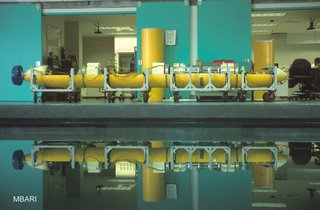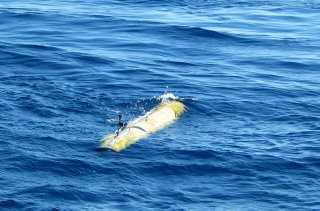 The Dorado class AUV is 21 inches in diameter and can be as short as 8' or as long as 21'. This robot can map the seafloor with higher resolution than is possible with hull-mounted or towed sonar systems.
The Dorado class AUV is 21 inches in diameter and can be as short as 8' or as long as 21'. This robot can map the seafloor with higher resolution than is possible with hull-mounted or towed sonar systems.
The MBARI Mapping AUV is a torpedo-shaped vehicle equipped with four mapping sonars that operate simultaneously during a mission. The sonars are a swath multibeam sonar, two frequencies of sidescan sonars, and a sub-bottom profiler. The multibeam sonar produces high-resolution bathymetry (analogous to topography on land), the sidescan sonars produce imagery based on the intensity of the sound energy's reflections, and the subbottom profiler penetrates sediments on the seafloor, allowing the detection of layers within the sediments, faults, and depth to the basement rock. The vehicle is launched on programmed missions and runs on its own battery power until it returns to the ship, as programmed, for recovery. 
Such robots are great for such underwater explorations. Compared to a human being, they have better underwater capabilities- they last longer underwater, have increased depth explorations and also have better detection mechanisms. The main thing is still safety when such robots are concerned, as using such robots reduces the chance of a fatal accident happening to zero.
Also, I believe that such AUV robots will have great potential uses, for example, the study of hurricanes, coastal erosion, ocean exploration and fisheries stock assessments. As a student who is particularly interested in defence technology, I also believe that such robots will be able to employ anti-mine technology and also improved submarine detection. Current technology has already acquired some of the above "skills", but such "skills" are not perfected as the robots will still make errors like a human. Thus, much work is still needed on robot recognition so that differentiation between background and the surrounding objects can be done without errors. There is so much that can be done to improve AUVs, but due to the limitations of present technology, the problem still exists such that the "skills" of the AUVs are limited too.
There is also a Singapore Robotic Games competition which involves underwater robots: http://guppy.mpe.nus.edu.sg/srg/urc.pdf . Such competitions promote the research in such categories of underwater exploration and thus will be able to spark potential engineers to create even better AUVs.
6 comments:
Seah Qiong Feng Sean
U036739M
In the maritime industry for AUVs, the use of robots is extremely useful to reach hard to navigate places. They are useful for deep-sea exploration, tracking information on water movement, temperature changes and other aspects of the current. I read that one way is that of robot mimicry, like a lobster robot, to adapt to the natural surroundings. Deep sea exploration is really quite interesting.
Choo Liang Kwang U046028R
Yes. AUVs can reach depths that humans cannot in a shorter time. Deep sea divers have high risks, and have to be careful not to go beyond a certain depth limit for their own safety. Maybe one day, they can be used for deep sea repairs, and will be able to discover new marine species at depths that humans are not capable of reaching.
Foo Jit Soon U059592R
Yup think I have missed out the part on the shape of the robot. I guess that it might be highly possible soon that robots with AI are created which can allow them to follow schools of fishes and live with them too.
Xu Xiao U036505H
This AUV is certainly a brand new area of research. It is interesting to see robots can go deep into the water and accomplish tasks that is usually done by the humans.
For the sake of safety for divers/sea explorers, AUV really reduces the accident rate to absolute zero. However, I am wondering if the AUV robot can handle the extreme pressure once it is really deep into the sea. Wouldn't the enormous pressure crush the AUV? And what if some sea animals attack the AUV? does it have any security/self-protection system? Another issue: will the AUV cause some disturbance to the natural sea life?
guess i ask too many negative questions. will stop here. definitely this AUV robot will do more benefits than the harm it brings, if there is any.
Foo Jit Soon U059592R
Hmm... pollution and security wise, I agree with you that it has not been resolved. But, I still think that AUV is something that can be improved in time to come. With great improvements in the area of exploration, other features can be added in time to come. AUV to me will be one of the greatest technology in time to come I strongly believe.
Prakash S/O Yanaprakasam
U036229B
Autonomous Underwater Vehicles are going to be the only way man is ever going to be able to understand and explore the intrinsic environment of deep oceans in the future.The main reason is the extreme pressure and the high risks involved in submerging submarines with humans to such depths.I agree with the author that there is some way to go before the technology reaches sufficient efficiency to operate properly. For example, at great depths, the hydraulic systems of the robotic arms need to work in the harsh environment of great pressures and the possibilty of failures is very high.
Post a Comment